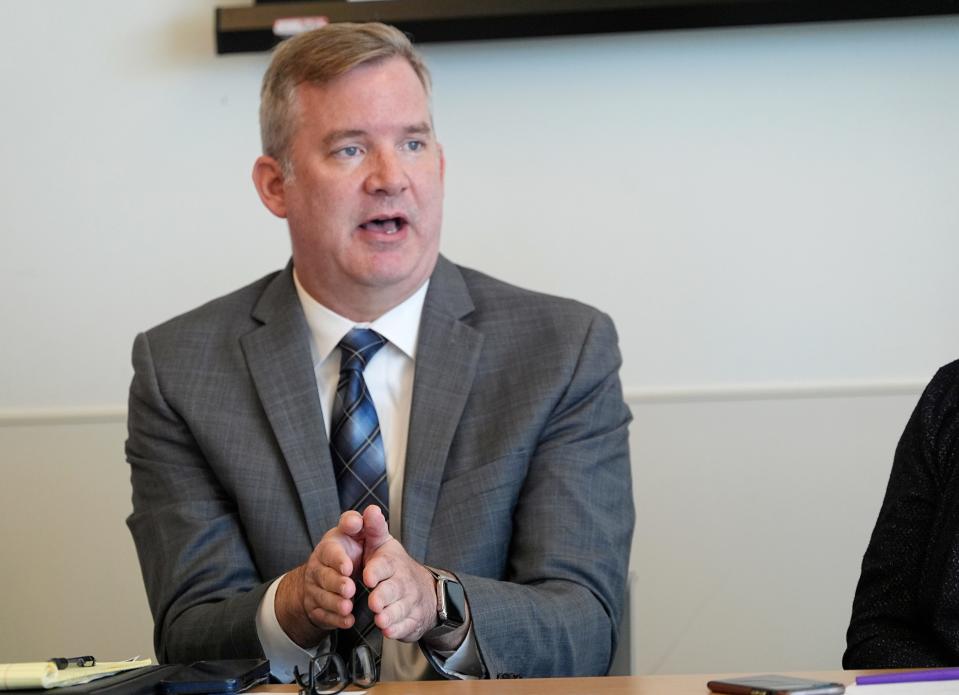A lively roundtable discussion on tenant rights and housing needs in Oklahoma City recently drew dozens of people to the city’s historic Capitol Hill district.
The public meeting, held Wednesday in the Capitol Hill Library and hosted by the Oklahoma City Human Rights Commission, explored the topic of housing as a human right amid various factors for the city’s high eviction rate, which is the 20th-worst for cities across the country. According to Oklahoma City nonprofit Shelterwell, Oklahoma as a state ranks 6th in the nation for evictions.
The discussion featured the perspectives of Gregory Beben, a longtime attorney for Legal Aid Services of Oklahoma; Jenna Pilcher, an attorney for the Housing Eviction Legal Assistance Program (HELP) at Oklahoma City University School of Law; and Lisa Chronister, the Assistant Director of the Oklahoma City Planning Department.
The latest iteration of the commission is nearing the end of its second year, commission chair Valerie Couch said, but it meets every two months to address alleged harm to residents who have faced discrimination because of race, color, sex, gender, national origin, age, disability and other protected classes.
“We’ve also been focused on identifying issues that the Human Rights Commission can actually take action on, either through advocacy or other partnerships,” Couch said. “These meetings we’ve been using to build relationships, partnerships, and understanding as deeply as we can what the landscape looks like for housing in Oklahoma City.”
The commission was approved by a 5-4 Oklahoma City Council vote in mid-2022, after nearly two years of research by a mayor-appointed task force on whether the city needed such a commission again. The last Human Rights Commission was previously disbanded in 1996 when city councilmembers disagreed with commissioners trying to protect the rights of LGBTQ+ residents.
Related: Facing eviction and need legal help? Advocates working to make sure help is available
Much of the discussion Wednesday was fueled by disagreements between panelists and other guests over what actually is the driving force of evictions. Some laid much of the blame on landlords and excessive charges, while others argued it was due to a shortage of affordable housing and an inadequate minimum wage.
When a tenant is served with an eviction action, the tenant does not have to move out of the residence immediately. Landlords are not legally able to lock out a tenant without first going to court and getting a judge’s order. But Beben said the rate of evictions in Oklahoma County have returned to pre-pandemic levels, and that tenants throughout the state are evicted too quickly in comparison to other states.
“Once you show up to court, those tenants are two days away from being locked out by the sheriff,” Beben said. “If they lost their court hearing, they’re as little as 48 hours away from being locked out. Sometimes it’s a little longer, depending on how backed up the sheriff’s office is, but that’s what we’re dealing with, and there’s growing concern and growing interest in that timeframe and how fast that process is.”
The economic crisis brought on by the pandemic illustrated to Beben and others that more work needed to be done to protect tenants, but several pandemic-era relief funds have ended. He, Pilcher and the commission’s compliance officer Emma Winiski are taking part in an expanded “right-to-counsel” project to look at what strategies for legal services are working in peer cities that could then be applied in Oklahoma City.
More: Legal aid help for renters facing eviction in Oklahoma City is working and being expanded

Pilcher expects to soon become director of OCU Law’s HELP, which provides pro bono pre-eviction dispute representation for all counties in the state and eviction defense and litigation for Oklahoma County specifically. She said some helpful solutions would include keeping landlords from charging a tenant higher additional eviction filing fees, as well as increasing the visibility of dismissed cases on a tenant’s record so that they have better chances of securing future housing.
“I actually just had one case last week where (a woman) had seven evictions on her record,” Pilcher said. “Granted, the most recent one was she didn’t pay the rent, but the six before that, the plaintiff filed and then the landlord never showed up — but she got denied at three different new apartments.”
However, Robert Goldman, a local attorney who’s represented many landlords, objected to suggestions that he believed characterized landlords as predatory, arguing that most would rather have their tenants remain at their rental properties and not have to go through a costly court battle themselves.
“There’s no landlords that I know of that are not interested in making a profit,” Goldman said. “They’re not making a profit by evicting a bunch of tenants and paying court costs and hiring attorneys to do that. Right now in our city, the tenants are well-represented in court. Legal Aid has four or five attorneys at almost every docket that I attend.”
Instead, Goldman said roughly 90% of cases he sees are due to tenants’ failure to pay. Although he did admit eviction filings were high, he also argued that many landlords were willing to mediate a resolution with tenants before they are actually forced out of their homes.
When asked by Couch why they believed evictions were so high, Goldman and a few other attendees said it was because residents are just not making enough money.
“I think there are industries in this city that are very happy with minimum wage being at $7.25, and they’re going to push back at any type of situation that’s going to raise the minimum,” he said.
Related: Ballot measure to increase Oklahoma’s minimum wage set for 2026

Affordable housing issues complicated by zoning restrictions
When the subject turned to the lack of affordable housing in the city, Chronister pointed to a 2021 study that recommended increasing long-term affordable rental units in the city and expanding funds for their development.
But she said long-held zoning regulations on accessory dwellings, maximum occupancy, lot sizes, density limits and single-family residences have all made it difficult to build more affordable housing in the city’s urban core.
The city has been working to update zoning codes for years so as to better enact the city’s comprehensive “planokc,” and Chronister said an affordable housing implementation plan would be presented to city councilmembers in the near future.
In the meantime, the recent push to lift a decades-old ban on accessory dwelling units (also known as backyard cottages or granny flats) has been impeded by some residents’ concerns that it could instead boost home-sharing services like Airbnb and not actually improve the city’s housing supply. But Chronister is hopeful the Planning Commission will recommend the updated city ordinance to council in late October.
“The benefits of accessory dwellings, we feel, are great,” Chronister said. “For this discussion, it expands housing capacity. If all of the single-family residences in the city added an accessory dwelling, it would be doubling the housing stock. It creates affordable housing in traditional neighborhoods, especially neighborhoods that people might be priced out.”
More: City planners want to know what OKC residents think about backyard ‘granny flats’
Better outreach for aid services needed
Residents of color are especially affected by issues with housing and affordability. Pilcher said about 60% of HELP cases are minority clients, while 40% are white, and Black women with children were disproportionately represented in Oklahoma County eviction data earlier this year. Beben said many mothers fell behind on rent payments in August because of the need to buy school supplies.
One attendee, Antone Bates-Bey, who has lived for nearly a decade at the Will Rogers Courts public housing complex, asked specifically how the city and the legal assistance attorneys planned to better inform residents from minority communities who could benefit from their services.
“Sometimes we don’t have the resources or have knowledge of the resources that’s available to us, to be able to help ourselves,” Bates-Bey said. “A lot of the times, we have meetings and stuff like this and most times people are at work because they’re focused on paying their bills.”
Pilcher said she hoped to begin a social media strategy for short educational videos about HELP, while Winiski said the local Housing and Community Development Team had recently met to discuss how to update a five-year plan on expanding outreach for its housing rehabilitation and loan assistance programs.
Tobias Frederick, a retired police officer now working as a civil rights enforcement investigator for the Attorney General’s Office, said that the agency hosts symposiums on housing and employment issues and would be willing to assist with outreach. He also told commissioners and landlords that the biggest problems he sees as an enforcer are issues with public accommodation compliance.
“I understand paying rent and things like that — that’s a big issue,” Frederick said. “But from what I see statewide, we have a lot of property managers and landlords … that avoid some of the things that they know that they’re supposed to be doing as it relates to public accommodations.”
Tenant advocacy discussion held day after OKC rehousing initiative update
Wednesday’s meeting continued a commission discussion on housing that began at its last meeting in July. Two months prior, the city released its annual Point in Time Count, a “snapshot” survey of the city’s unhoused population, which indicated the number of people experiencing homelessness had increased by 28% since the survey had been conducted in 2023.
Despite the increase in homelessness for Oklahoma City, progress was still being made on the issue. City councilmembers received a presentation Monday of a Fiscal Year 2024 report from the Key to Home Partnership, a public-private alliance of city agencies, state departments, local businesses and nonprofit organizations dedicated to reducing chronic and unsheltered homelessness in Oklahoma City.
Launched citywide in September 2023, Key to Home aims to rehouse 500 people by the end of 2025. Staff for the partnership go to people in their encampments, create relationships with landlords and work together to place them in secure housing. Outcomes on the rehousing initiative have been overwhelmingly positive, with only 3% of people rehoused so far re-experiencing homelessness.
“By June, we had housed 214 people out of 15 encampments,” said Jamie Caves, Key to Home’s strategy implementation manager. “91% of the people that were offered housing have accepted housing, which is remarkable.”
This article originally appeared on Oklahoman: Human Rights Commission discusses tenants rights, OKC eviction rate
EMEA Tribune is not involved in this news article, it is taken from our partners and or from the News Agencies. Copyright and Credit go to the News Agencies, email news@emeatribune.com Follow our WhatsApp verified Channel




